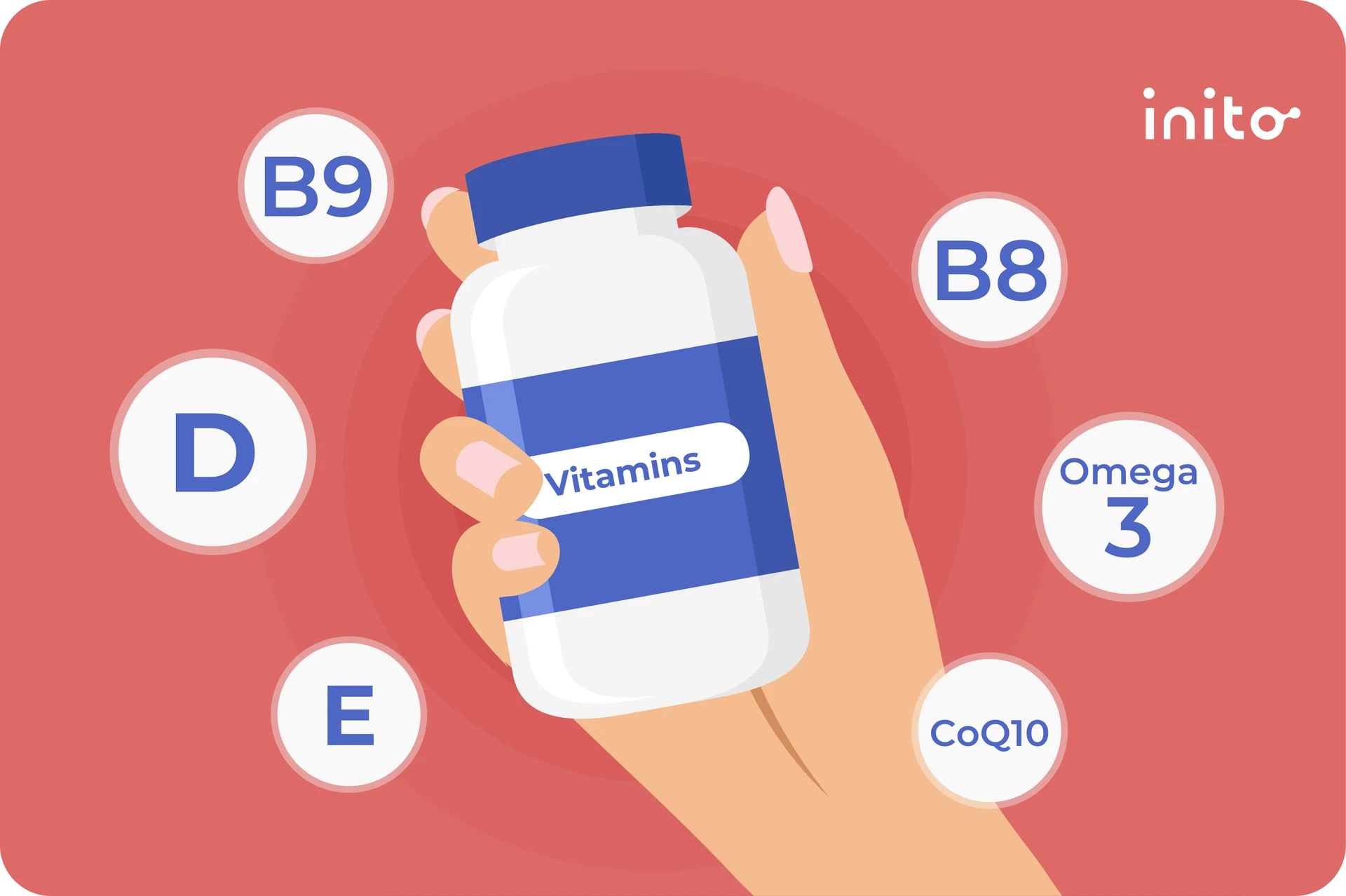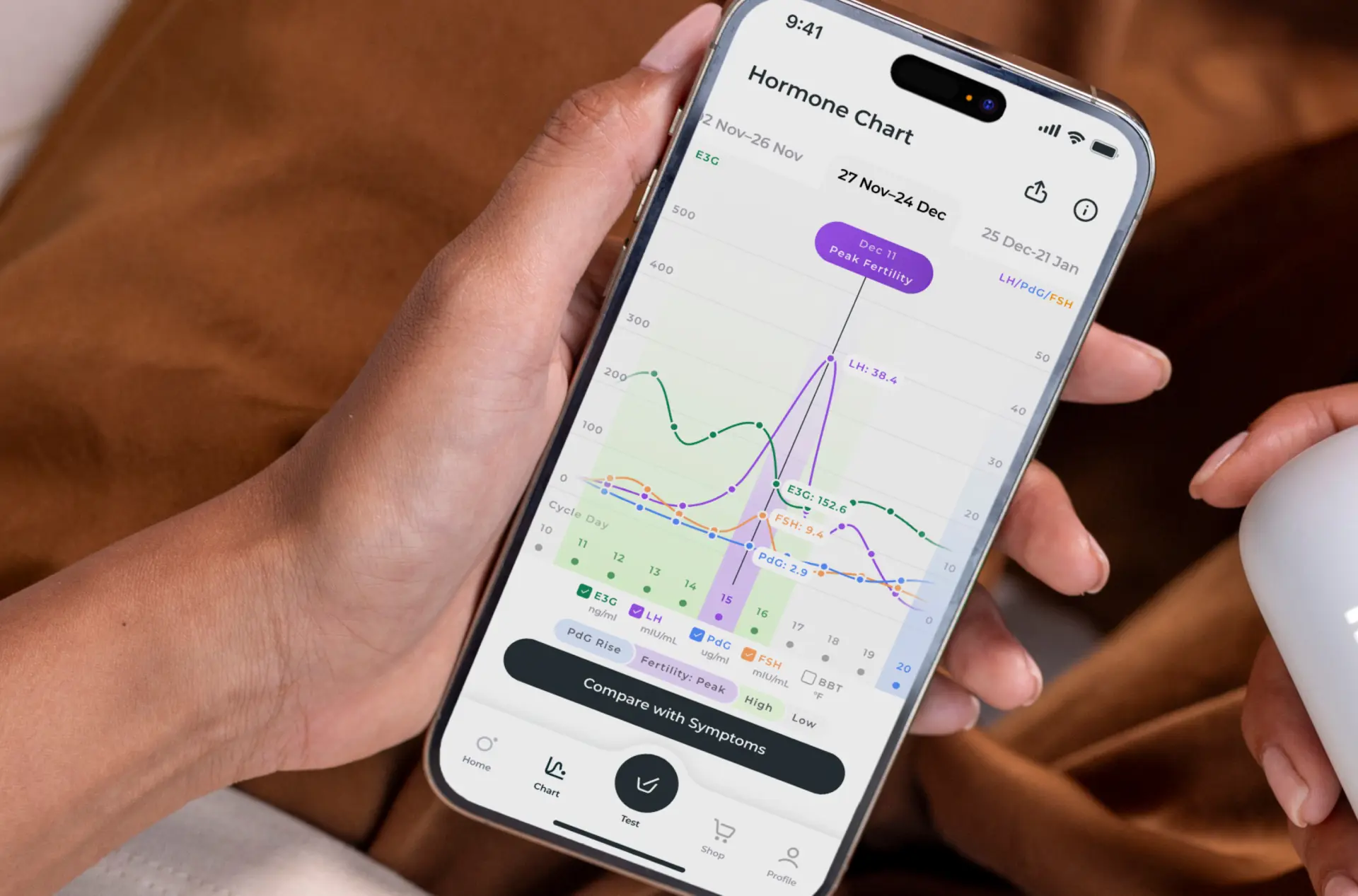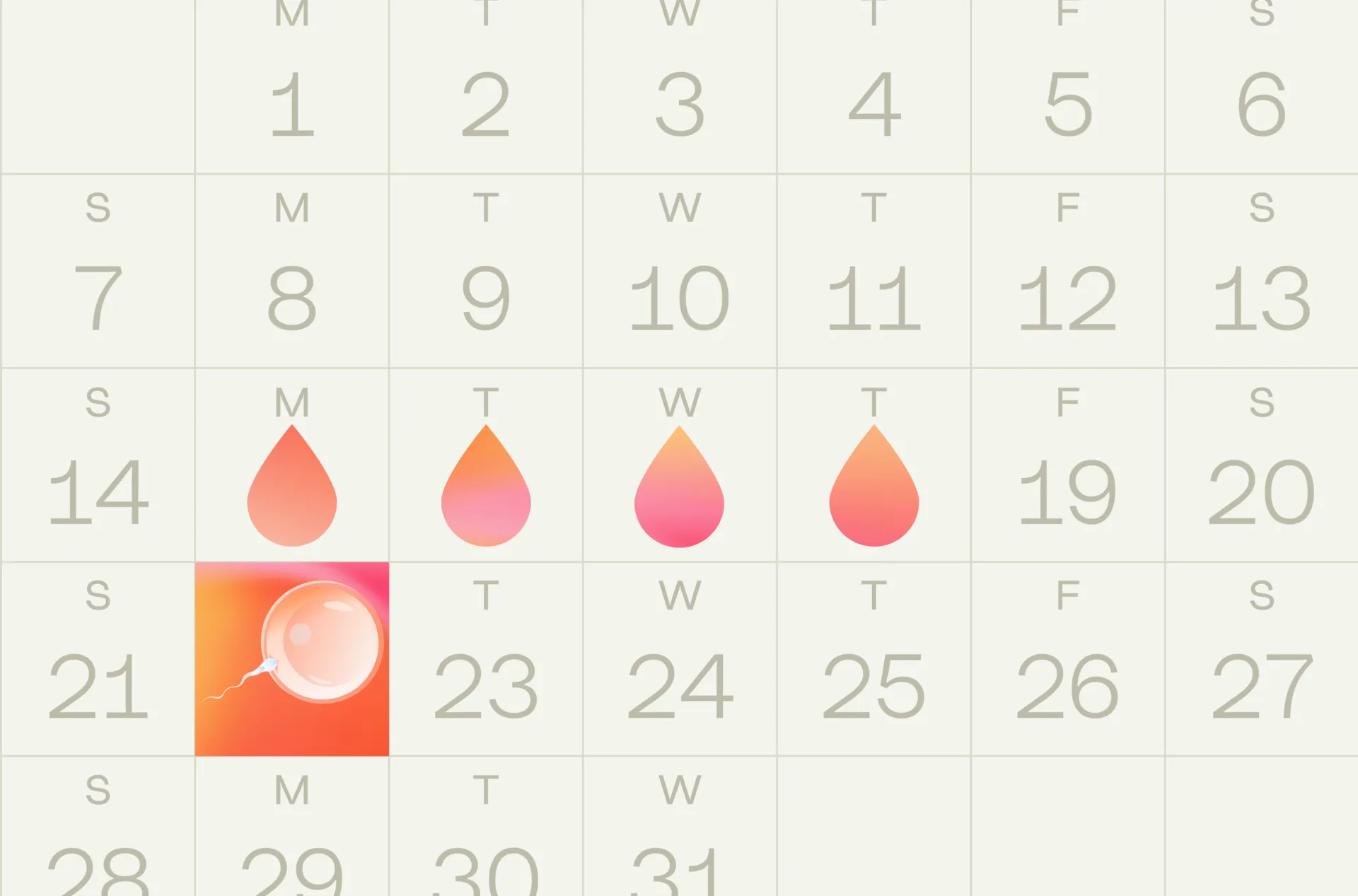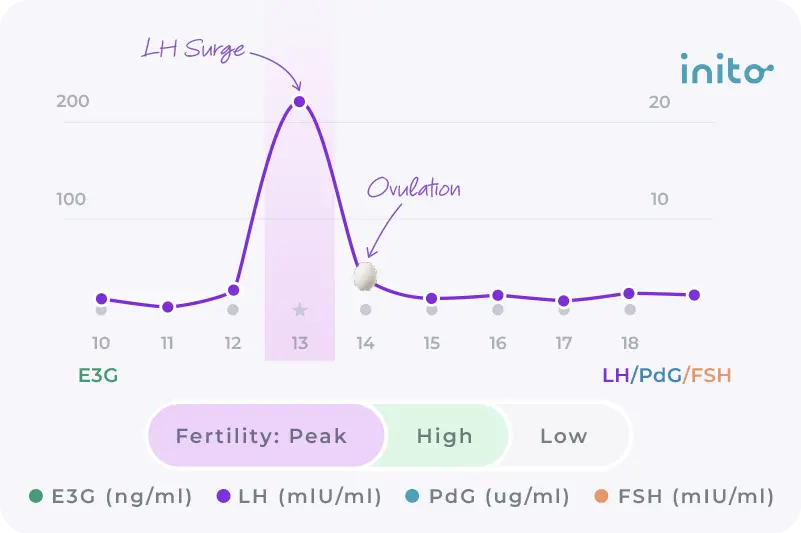Content table
Wondering about what vitamins you should take to boost fertility?
There’s no doubt that your nutrition plays an essential role in your overall health and ability to conceive. Your body needs certain vitamins and nutrients in order to support a healthy pregnancy.
Thankfully, you can get many of these vitamins from a well-balanced diet. But there are also some supplements you can take to fill in any nutritional gaps you may have. Read on for a complete run-down on supplementing with vitamins for fertility.
Disclaimer: Make sure you consult with your doctor before you begin taking supplements for fertility.
Takeaways
- A healthy diet full of vitamins and nutrients supports fertility and reproductive health.
- Some key vitamins and minerals that are recommended for fertility include:
Folic acid
Vitamin D
Myo-inositol
Vitamin E
Omega-3 fatty acids
CoQ10 - To support fertility and reproductive health, you can supplement a healthy diet with dietary supplements.
- Pregnant women should also ensure they are getting enough of these dietary supplements: folic acid, vitamin D, iron, calcium, cholic, B vitamins, and omega-3 fatty acids.
- Whether pregnant or TTC, talk to your doctor before taking dietary supplements.
- Other ways to support both male and female fertility include: sleeping well, lowering stress, and exercising moderately.
Prenatal vitamins and supplements for female fertility
Below you’ll find an overview of recommended vitamins to balance hormones for females who are trying to conceive.
1. Folic acid (aka vitamin B9)
You’ve probably heard of this one before! Vitamin B9, or folic acid, is a prenatal vitamin that has been proven to help prevent birth defects like neural tube defects. (These are birth defects that affect either the brain or spine.)
When you’re pregnant, folic acid also assists with the overall growth and development of the placenta and growing fetus.
But what most people don’t realize is that folic acid can also help women who are trying to get pregnant.
Here’s a look at what some of the latest research suggests about folic acid and reproductive health:
Study | Relevant findings |
One study looked at the impact of taking dietary folate on antral follicle count (AFC) in over 550 women seeking fertility treatment. (AFC is an important marker of ovarian reserve, the amount of healthy eggs a woman has left) | Folate intake of up to 1,200 μg/day was linked to having a slightly higher AFC. This link was especially present in those who got their folate from a supplement, not just food. And beyond 1,200 μg/day, no additional impact was observed. Folate has also been associated with other important fertility markers like:
|
Another study of over 200 women looked at the impact of folate intake on outcomes for assisted reproductive technology (ART) treatments. | This study had two key findings:
|
(Note: Folate is found naturally in certain foods like eggs, legumes, citrus fruits, and leafy greens. Folic acid is the man-made version of folate that’s found in vitamins and supplements)
As you can see, there are some clear benefits in taking folate, or folic acid, when trying to conceive. Even if you’re already facing some fertility challenges or undergoing fertility treatments.
So when should you start taking folic acid for fertility and how much should you take?
- Folic acid dosing recommendation: 400-600 μg/day
- When to start taking folic acid? For the best results, start taking folic acid 3 months before trying to get pregnant. But if you’ve already been trying for a baby, don’t feel like you’re behind. Keep in mind that folate supplementation is only one part of your overall health and fertility.
2. Vitamin D
Research suggests that vitamin D is also important for both males and females when it comes to reproductive health and IVF outcomes.
Here’s what some of the latest studies have to say about Vitamin D for fertility:
Study | Relevant findings |
One study examined research involving over 2300 patients with infertility and analyzed the impact of supplementing with vitamin D. | Female patients who took vitamin D had a significant increase in clinical pregnancy rates. Here were the specific dosages of vitamin D that led to improved pregnancy outcomes:
|
A retrospective study looked at data from two other studies totaling over 1200 patients with either PCOS or unexplained infertility. | The data showed that PCOS patients and those with vitamin D deficiency had much lower rates of:
|
Another study looked at the effects of taking vitamin D in PCOS patients who are IVF candidates. | Taking 50,000 IU of vitamin D every other week for a total of 8 weeks led to:
|
As you can see, vitamin D supplementation seems to be especially beneficial for PCOS patients who are trying to conceive.
So when should you start taking vitamin D for fertility and in what amount?
- Vitamin D dosing recommendation: 600 IU/day
- When to start taking vitamin D for fertility? If you have PCOS or a vitamin D deficiency, you should start supplementation as soon as you can. If you don’t have either of those issues though, you can start a couple of months prior to TTC.
FYI! Just be careful to avoid vitamin D excess (more than 4000 IU per day for people age 8 and older).
3. Vitamin E
Research has shown Vitamin E to be beneficial for women of reproductive age. This is because it acts as an antioxidant to help counteract certain reproductive disorders.
One small study looked at the effects of vitamin E supplementation for infertile women undergoing IUI.
They found that the women who took vitamin E had improved endometrial thickness. (This is a key factor in fertility as it prepares the uterine lining for implantation.)
So when should you start taking vitamin E for fertility and at what dosage?
- Vitamin E dosing recommendation: 400 IU/day
- When to start taking vitamin E for fertility? Start supplementing with vitamin E several months before you’re ready to conceive.
4. Myo-inositol (aka vitamin B8)
Better known as vitamin B8, myo-inositol is a key glucose molecule that plays a role in maturing your follicles. It’s not really a vitamin. Although, it’s vital for processing insulin and signaling your fertility hormones.
For those with polycystic ovary syndrome (PCOS), myo-inositol helps with:
- Better oocyte maturation
- Increased pregnancy rates
- Improved hormonal balance
Research proves that undergoing myo-inositol monotherapy (in addition to DCI D-chiro-inositol) can improve overall health outcomes for those with PCOS.
So when should you start taking myo-inositol for fertility and in what amount?
- Myo-inositol dosing recommendation: 1 – 2 grams per day
- When to start taking myo-inositol? 2-3 months before TTC
5. Omega-3 fatty acids
Omega-3 fatty acids are proven to boost fertility in a few ways.
Some of these benefits include:
- Balancing hormones
- Improving egg quality
- Regulating menstrual cycles
- Increasing the likelihood of implantation
One study of female mice found that a diet rich in omega-3 fatty acids led to better oocyte quality for advanced maternal age.
So when should you start tracking your omega-3 fatty acids intake and what’s a good amount for fertility?
- Omega-3 fatty acid consumption recommendation: If pregnant, you should get at least 200 mg of DHA each day. If TTC, talk to your doctor about what dosage is right for you as there’s no standard recommendation.
- When to start taking omega-3s? About 2 – 3 months before you start TTC
6. CoQ10
CoQ10 (aka coenzyme Q10) is a newer supplement that has made its mark in the fertility world. More research is needed to fully show the potential of this fertility supplement.
But as of now, smaller scale studies do show it has potential with fertility outcomes.
CoQ10 has shown some promise in improving egg health and IVF outcomes. It’s also been shown to help with PCOS symptoms and male fertility as well.
Know more: Everything You’ve Been Wondering About CoQ10 for Fertility, Answered
So when should you start taking CoQ10 for fertility and how much should you take?
- CoQ10 dosing recommendation: Talk to your doctor for dosing recommendations
- When to start taking CoQ10? About 3 – 6 months before TTC
At this point, you’ve learned a lot about how to boost fertility with certain supplements. So how can you actually make sure to get all of these vitamins? The next two sections will show you how.
Do you need to take prenatal vitamins for conceiving or can you get these from your diet?
If you’re trying for a baby, you’ll want to optimize your nutrition and overall health as early on as possible. Both your body and your future fetus require a lot of nutrients for healthy development.
But for some women, consuming a hormone-balancing diet may not be enough. This is where vitamins and fertility supplements come into play. Taking vitamins for fertility when you’re trying to get pregnant can ensure you have the right level of micronutrients.
Research shows that there are many benefits to taking vitamins when you’re TTC. Some of these include getting pregnant faster and a higher chance of conceiving.
So what’s the bottom line with supplementing for fertility?
Focus on getting as many nutrients as possible from the foods you eat. And if needed, add on fertility supplements for additional support. If you’re not sure whether or not you have a deficiency, ask your doctor!
Wondering which foods can give you these essential vitamins? Take a look at the chart in the next section.
Natural sources of vitamins and minerals for fertility
If you’re trying to get pregnant, make sure you’re getting a healthy dose of the foods below.
Disclaimer: Excessive consumption of vitamins can be harmful. So talk to your doctor before making any big changes to your diet or beginning a supplement regimen.
Vitamin | Found naturally in… |
Folic acid | Legumes, eggs, leafy greens, beets, broccoli, asparagus, citrus fruits |
Vitamin D | Oily fish, eggs, cheese, yogurt, fortified milk, orange juice, shitake mushrooms |
Vitamin E | Vegetable oils, nuts and seeds, foods fortified with vitamin E |
Myo-inositol | Cantaloupe, beans, nuts, legumes, red meat |
Omega-3 fatty acids | Fish, nuts and seeds, vegetable oils |
CoQ10 | Fish (salmon and sardines), soybeans, nuts, vegetable oils, and meat |
Incorporating more of these foods is a good starting place for TTC. But keep in mind, a healthy diet is only one component of your health and fertility status.
Eating a well-balanced diet is a great start. But for pregnancy and fertility, you will need some oral supplements. Folic acid is essential for all pregnant women. And vitamin D is recommended for those who are vitamin D deficient.
But what should you take if you do actually become pregnant? This is a slightly different ball-game, so jump to the next section to find out.
What vitamins to take if you’re pregnant?
Once you’re pregnant, your nutrition becomes even more important! You can get some vital nutrients from the foods you eat (which we’ll talk about next).
But to ensure you’re getting enough of the vitamins your body needs to support a healthy pregnancy, it’s a good idea to take prenatal multivitamins.
Here are the major vitamins and minerals your body needs during pregnancy:
- Folic acid
- Vitamin D
- Calcium
- Iron
- Choline
- Vitamin B6
- Vitamin B12
- Omega-3 fatty acids
While this is a pretty standard list, you’ll still want to talk to your doctor about your specific nutritional needs. Based on your medical history and your unique pregnancy, you may require additional vitamins or different amounts of the ones listed here.
Not pregnant yet but open to all the ways for boosting fertility? There are lots of small things you can do to take back some control over your hormones and fertility. We’ll go over these next!
Other ways to boost your fertility naturally
Track your cycles
One great way to improve your fertility outcomes is to know when you’re most fertile and confirm that you are ovulating. The Inito fertility monitor can help you do both of these!
By giving you your exact values of LH, estrogen, and FSH, Inito can help you accurately forecast your most fertile days. And because the same test strip also detects your PdG (urine metabolite of progesterone), you can confirm if you’ve ovulated.
Manage your weight
Sustaining your body’s natural ideal weight is beneficial for both your health and your fertility.
If you’re overweight or your BMI is higher than it should be, reducing 5-10% of your body weight may help balance your hormones. If you’re underweight, you’ll want to increase your calories to achieve a healthy weight.
In either case, talk to your doctor or fertility specialist about healthy changes you can make to your diet to achieve your fertility goals.
Get enough physical activity
Moving your body is important for your overall health. But it’s also important for your chances of conception too.
Aim to get between 30 and 60 minutes of moderate exercise each day. Just keep in mind that over-exercising (more than 60 minutes/day can lead to a higher risk of anovulation). So avoid over-exerting yourself!
Keep your stress in check
Trying to conceive can be notoriously stressful. But unfortunately, high levels of stress can work against your fertility.
So here are some practices that help reduce stress and improve mental health:
- Yoga or light exercising
- Meditation
- EFT/tapping
- Deep breathing
Get plenty of sleep
Just like managing your weight and stress, practicing healthy sleep habits is vital for boosting your fertility.
Here’s a glance at what research shows about sleep and fertility:
- Quality, uninterrupted sleep can lead to a 20% improvement in follicle stimulating hormone (FSH) levels
- Sleeping on a regular schedule can lead to a 60% improvement in estrogen balance
- For every one hour of sleep, your progesterone levels improve by 9.4%
Seek support
The conception journey can be overwhelming. But you don’t have to go it alone! Consider joining a fertility support group, like Inito’s Facebook group, for moral support.
This can be one way for you to reduce your stress and also get practical tips and advice from other women who are TTC.
Read more: 11 Natural Ways and Diet Tips to Balance Your Hormones

FAQs
There are a few simple ways you can balance your hormones when you’re trying to conceive. Try eating more foods that contain vitamins and nutrients that are vital for pregnancy. These include folate, B vitamins, Vitamin D, and omega-3 fatty acids. You can also make sure to sleep enough, manage your stress, and exercise regularly.
Prenatal supplements include vitamins that are also helpful for fertility.
Some studies show that folic acid can improve antral follicle count (AFC) and live birth rates for assisted reproductive technology (ART) patients.
There is mixed research on the exact relationship between vitamin D and estrogen. But some studies show that vitamin D intake actually decreases estrogen levels.
You’ve likely seen advertisements for male prenatal vitamins. But as of now, there’s a lack of research on the effectiveness of male prenatals on pregnancy outcomes. But it’s still worth a discussion with your doctor or fertility specialist.
There’s no set time for how long you can get pregnant after you begin taking fertility vitamins. That said, for the optimal effect, you’ll want to begin fertility vitamins about 2 – 3 months before TTC.
Neither is necessarily “better” than the other. Folate is naturally present in foods while folic acid is in the form of a vitamin. So you can eat foods that contain folate like citrus fruits and certain legumes and veggies. But you can also take fertility supplements with folic acid.
What’s most important is that you’re getting enough folic acid for pregnancy (600 mcg).
Was this article helpful?
- Nutrition During Pregnancy – ACOG
- Folic Acid – CDC
- Folate intake and ovarian reserve – FertStert
- How and when to take folic acid – NHS
- Effects of Vitamin D on Fertility, Pregnancy, and PCOS – PubMed
- Influence of Vitamin D Supplementation on Reproductive Outcomes – RBEJ
- Vitamin D Deficiency is Associated with Poor Ovarian Stimulation – PubMed
- Vitamin D Deficiency and Female Infertility – Science Direct
- The effects of vitamin D supplementation on metabolic profiles and gene expression – PubMed
- Vitamin E as an Antioxidant in Female Reproductive Health – PubMed
- Vitamin E on Controlled Ovarian Stimulation – PubMed
- Are Vitamin E Supplements Beneficial for Female Gynaecology Health? – PubMed
- Comparative Efficacy of Oral Insulin Sensitizers Metaformin – PubMed
- Management of Women with PCOS Using Myo-inositol and Folic Acid – DeGruyter
- Vitamin E Effect on Controlled Ovarian Stimulation of Unexplained Infertile Women – PubMed
- Prolonging the Female Reproductive Lifespan – PubMed
- Omega-3 Fatty Acids and Pregnancy – PMC
- Nutrition During Pregnancy | ACOG
- The Impact of Preconceptional Multiple-Micronutrient Supplementation on Female Fertility – Ella Schaefer, Deborah Nock, 2019
- Effect of Exercise on Ovulation: A Systematic Review | Sports Medicine
- Perceived stress, reproductive hormones, and ovulatory function: a prospective cohort study – PMC
- Discrepancies between the internet and academic literature regarding vitamin use for male infertility












